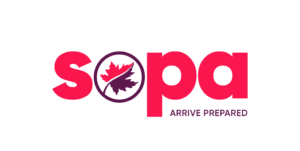The Top 3 Newcomer Misconceptions When Preparing to Move to Canada
#1 – “No rush! I can wait and prepare for my move closer to my landing date”
Be it work or family commitments, many newcomers manage completing priorities on their lists to do in their home countries before moving to Canada. These commitments delay the need to learn about the Canadian job market, workplace culture, settlement needs, and other key factors that help newcomers transition smoothly into their Canadian communities.
The pandemic has particularly sprinkled a dose of unprecedented uncertainty on the challenges newcomers face before landing in Canada. Not knowing when to land or when to sell assets back home typically makes learning about Canada a lesser priority for the future.
The Government of Canada funds various pre-arrival programs that provide structure to the efforts of future newcomers as they prepare to move to Canada. The pre-arrival programs, such as SOPA, can make learning about Canadian culture and settlement-related aspects straightforward and efficient. Pre-arrival programs help newcomers smoothly transition into their Canadian communities.
Reflecting on my own experience before landing in Canada, I started preparing for my move about seven months prior. My SOPA intake counsellor walked me through the steps needed to settle in my province of destination. I had the opportunity to ask questions regarding provincial healthcare, finding longer-term accommodation, and navigating the local transit system. The most amazing part of my counselling was receiving information from someone who lives in the province of my destination.
I cannot emphasize enough how important it was to start preparing for my move as early as possible. All the knowledge gained through SOPA gave me a jump-start. I was able to not only find rent before landing but also find employment in less than a month after I started applying.
#2 – “I will learn about the Canadian workplace culture after I land”
As an employment specialist, I often network with Canadian employers during webinars. I always make sure to ask them what they primarily look for in candidates. Recently, during my conversation with an HR officer at a Canadian software development company, I learned that their main priority when interviewing candidates is interpersonal skills (a.k.a soft skills). This surprised me; although the field is technical, they still focus on the soft skills. They mentioned that the company can train people on certain missing technical skills, but not on soft skills.
Newcomers often need to reflect on how the Canadian workplace culture differs from the culture in their home countries. This helps them identify certain similarities and gaps. Once they are able to identify those things and address them, then they can transition smoothly into the Canadian workplace culture.
From my experience, the ability to reflect on cultural differences and address any underlying gaps is the main factor for a newcomer to be successful in a Canadian workplace. You are probably familiar with the term “Canadian Experience”. It is the umbrella term that may mean that a person is not able to fit well into a team due to low language skills or lack of awareness of cultural differences.
Thankfully, newcomers have access to a myriad of resources to help them become more familiar with the workplace culture in Canada. For instance, SOPA offers six engaging courses on key soft skills and integrating into the Canadian workplace culture. In my opinion, this is one of the most important investments a newcomer can do to prepare for their Canadian journey.
#3 – “I have landed jobs in the past! How different can the Canadian labour market be?”
I heard from many newcomers that they had no problem securing jobs in their home countries. This is always great news! After a few follow-up questions, I often realize that many of my clients don’t know how the Applicant Tracking System (ATS) software works. Quite often they have no knowledge of Canadian workplace culture or have never worked in a diverse environment that requires a certain degree of intercultural intelligence.
Nowadays, ATS are widely used as part of Talent Acquisition Software and are only gaining more ground with Canadian employers. Newcomers who don’t’ know how ATS works are at a disadvantage when it comes to other candidates who created ATS-friendly resumes in the past. Newcomers may also be unaware of other aspects of job searching such as: highlighting soft skills, networking, or emphasizing tangible past accomplishments.
By joining the SOPA program you will have access to our unique online courses. During these courses you will learn about the Canadian labour market, best practices when navigating the local job market and more. You will meet with SOPA Employment Specialists located in the province of your destination. There are plenty of resources online such as the Job Bank website to learn about the local job market. However, an important aspect of pre-arrival programs is that they help you synthesize and focus on key information when planning your career in Canada.
Settlement Online Pre-Arrival (SOPA) is an Immigration, Refugees & Citizenship Canada (IRCC) funded program that delivers free pre-arrival services for job readiness, success and retention.Explore the free, pre-arrival resources, services and courses we offer at ArrivePrepared.ca.
Post written by Mar Smaili, SOPA Ontario Employment Specialist
 Mar Smaili is a SOPA Employment Specialist. Mar is passionate about the confluence of employment counselling and intercultural dynamics in organizations. He enjoys exploring and reflecting on best practices pertaining to career development and newcomers’ integration in the labour market. In order to further his expertise in the field of career counselling, Mar is currently preparing for his Certified Career Development Practitioner (CCDP) designation in Ontario. Mar received his Master in Business Administration in the United States and is fully eligible for the Certified Career Strategist (CCS) designation in Canada.
Mar Smaili is a SOPA Employment Specialist. Mar is passionate about the confluence of employment counselling and intercultural dynamics in organizations. He enjoys exploring and reflecting on best practices pertaining to career development and newcomers’ integration in the labour market. In order to further his expertise in the field of career counselling, Mar is currently preparing for his Certified Career Development Practitioner (CCDP) designation in Ontario. Mar received his Master in Business Administration in the United States and is fully eligible for the Certified Career Strategist (CCS) designation in Canada.
